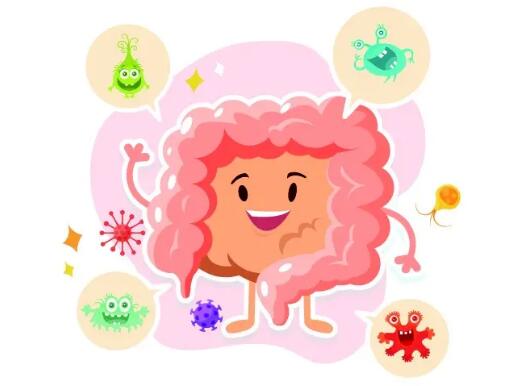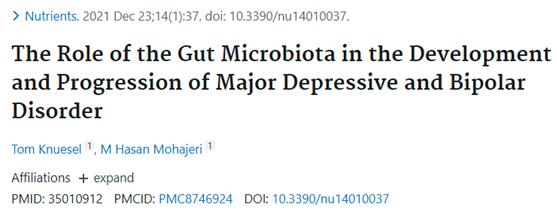肠道菌群在重度抑郁症和双相情感障碍的发展和进展中的作用
日期: 2024-10-10
点击量: 170
越来越多的啮齿动物研究表明,肠道微生物群和大脑之间存在联系,但全面的人类数据很少。在这里,我们系统地回顾了肠道微生物群与重度抑郁症和双相情感障碍之间联系的人体研究。在这篇综述中,我们讨论了细菌丰度的各种变化,特别是在低分类水平上,与重度抑郁症和双相情感障碍的病理生理学的联系,它们作为诊断和治疗反应参数的使用,它们促进健康的潜力,以及新的辅助治疗方案。
抑郁症患者肠道菌群的多样性大多减少。放线菌门、双歧杆菌科和拟杆菌属的数量持续增加,瘤胃球菌科、粪杆菌属和Roseburia属的数量减少。含有双歧杆菌和/或乳酸杆菌的益生菌似乎可以改善抑郁症状,使用不同益生菌和合生素的新方法显示出有希望的结果。通过比较双胞胎研究,我们在这里报告,在患抑郁症风险增加的情况下,发现了朝着“抑郁症样”微生物群的微生物变化。总的来说,这些发现强调了微生物群的重要性,以及更好地理解其变化对抑郁症状的影响的必要性,这可能会导致通过改变肠道微生物群来缓解抑郁症状的新方法。


延伸阅读
A growing number of studies inrodents indicate a connection between the intestinal microbiota and the brain,but comprehensive human data is scarce. Here, we systematically reviewed humanstudies examining the connection between the intestinal microbiota and majordepressive and bipolar disorder. In this review we discuss various changes inbacterial abundance, particularly on low taxonomic levels, in terms of aconnection with the pathophysiology of major depressive and bipolar disorder,their use as a diagnostic and treatment response parameter, theirhealth-promoting potential, as well as novel adjunctive treatment options. Thediversity of the intestinal microbiota is mostly decreased in depressedsubjects. A consistent elevation of phylum Actinobacteria, familyBifidobacteriaceae, and genusBacteroides, and a reduction offamily Ruminococcaceae, genus Faecalibacterium, and genus Roseburia wasreported. Probiotics containing Bifidobacterium and/or Lactobacillus spp.seemed to improve depressive symptoms, and novel approaches with differentprobiotics and synbiotics showed promising results. Comparing twin studies, wereport here that already with an elevated risk of developing depression,microbial changes towards a "depression-like" microbiota were found.Overall, these findings highlight the importance of the microbiota and thenecessity for a better understanding of its changes contributing to depressivesymptoms, potentially leading to new approaches to alleviate depressivesymptoms via alterations of the gut microbiota.
A growing number of studies inrodents indicate a connection between the intestinal microbiota and the brain,but comprehensive human data is scarce. Here, we systematically reviewed humanstudies examining the connection between the intestinal microbiota and majordepressive and bipolar disorder. In this review we discuss various changes inbacterial abundance, particularly on low taxonomic levels, in terms of aconnection with the pathophysiology of major depressive and bipolar disorder,their use as a diagnostic and treatment response parameter, theirhealth-promoting potential, as well as novel adjunctive treatment options. Thediversity of the intestinal microbiota is mostly decreased in depressedsubjects. A consistent elevation of phylum Actinobacteria, familyBifidobacteriaceae, and genusBacteroides, and a reduction offamily Ruminococcaceae, genus Faecalibacterium, and genus Roseburia wasreported. Probiotics containing Bifidobacterium and/or Lactobacillus spp.seemed to improve depressive symptoms, and novel approaches with differentprobiotics and synbiotics showed promising results. Comparing twin studies, wereport here that already with an elevated risk of developing depression,microbial changes towards a "depression-like" microbiota were found.Overall, these findings highlight the importance of the microbiota and thenecessity for a better understanding of its changes contributing to depressivesymptoms, potentially leading to new approaches to alleviate depressivesymptoms via alterations of the gut microbiota.
转载自网络,如有侵权,请联系删除
下一篇:
儿童注意力缺陷多动障碍





